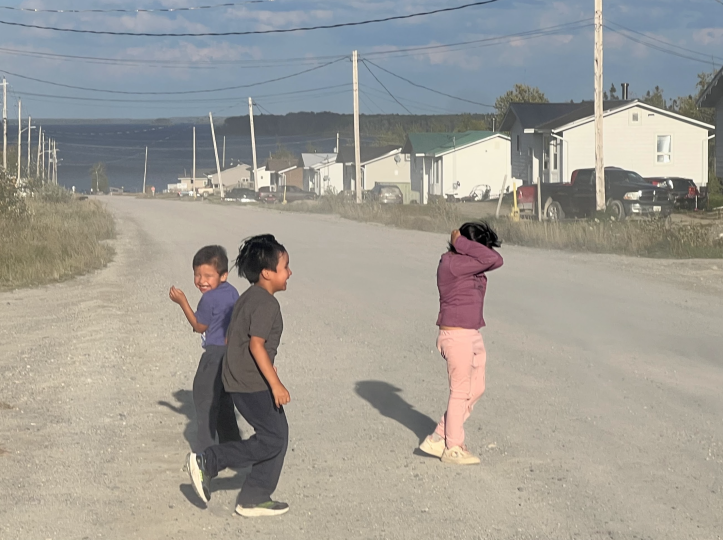Ontario Provincial Police arrested two suspects on Thursday following a two-day, shelter-in-place order in Ginoogaming First Nation and the neighbouring town of Longlac. OPP charged them with second degree murder in the shooting death of Ginoogaming man Sebastian Towegishig. Another victim has been transported 300 kilometres west to Thunder Bay to receive intensive care for gunshot wounds.
First Nations across far northern Ontario are now calling on Canada and Ontario’s governments to make a priority of ridding their communities of illicit drugs, some making public safety a prerequisite to conversations about mining.
Ginoogaming has been under a state of emergency since May 2024, when Chief Sheri Taylor and her council called for a full-time police presence to contend with drugs and gangs. She reiterated that state of emergency, claiming Canada and Ontario need to support her beyond “band-aid” solutions.
“We’re not going to sit back and let this underground world of drugs and violence take over our community anymore,” Taylor said, warning the leadership will banish anyone known to be selling drugs. “These are unprecedented times we’re dealing with.”

Nishnawbe Aski Nation chiefs declared a state of emergency across its 49 communities on Thursday over illicit drugs and gang violence.
“It has come to the point in some cases where our chiefs and councils feel they’re losing control of their communities, because we have outsiders coming in from Winnipeg, Ottawa, Toronto and elsewhere, taking over the communities by fear and intimidation,” NAN Grand Chief Alvin Fiddler said at a press conference in Thunder Bay.
“What we’re calling on Canada and Ontario to do is to help us equip our leadership with the resources that they need and the tools that they will need to take back control of their communities.”
NAN claims the regional Nishnawbe Aski Police Service has increased fentanyl and cocaine seizures by 300 per cent since 2022. The declaration calls for “proper resourcing for border screening at points of entry such as airports, and sustained investments in prevention, and mental health and addictions supports.”
Fiddler has been disappointed by the response. On Friday, he posted to Facebook that it’s “beyond shameful” how Ontario has yet to reach out to Ginoogaming to offer condolences or offer assistance. The office of Ontario’s Indigenous minister, Greg Rickford, did not acknowledge Ricochet’s requests for comment.
Indigenous Services Canada spokesperson Jacinthe Goulet said the federal government has been in touch with Taylor and is supporting Matawa tribal council’s mental health workers as they work through this event with Ginoogaming members.
“They want the resources, they want development. They call it the ‘Ring of Fire.’ We’re the impacted communities.”
“ISC recognizes the serious and devastating impacts that drugs and organized crime are having in many Indigenous communities across the country,” her statement reads. “We continue to engage and support NAN on issues surrounding drugs, organized crime, and justice. The department is also working with Public Safety, as the federal lead for Indigenous policing, to coordinate further meetings and explore opportunities to support First Nations.”
For Cat Lake First Nation Chief Russell Wesley, the drug crisis reaches back to 2012 when the province established methadone and suboxone programs in municipalities to manage the opioid crisis. Wesley says that didn’t help First Nations, who fought hard to get suboxone programs . But during COVID, he watched an epidemic transform not just in opiates but in methamphetamines, cocaine, and heroin.
He’s urging governments to model their response on the Aboriginal Healing and Wellness Strategy, a federally-funded, provincially-delivered response to the solvent crisis in the 1980s.
“What I’ve been saying all along to provincial and federal governments is, you have to take a partnership approach to this issue,” he said. “We need to revisit this whole thing. We need treatment centres in a hub-and-spoke model, and fund it accordingly, all across Ontario.”
Ring of Fire puts community in the cross-hairs

Ginoogaming is the southmost member of Matawa, a tribal council comprised of nine First Nations who live within several hundred kilometres around an untapped 5,000-square-kilometre mineral deposit known as the Ring of Fire.
Taylor criticized Ontario Premier Doug Ford, who apologized in June for saying First Nations “keep coming hat in hand” to the government. She said Ontario’s sense of entitlement to resource extraction doesn’t supersede Ginoogaming’s entitlement to safety.
“Ontario, they’re another treaty partner that seems to say we’re the ones who have our hands out. It doesn’t seem that way to me. They have their hands out right now. They want the resources, they want development. They call it the ‘Ring of Fire.’ We’re the impacted communities.”
Eabametoong (Fort Hope First Nation) Chief Soloman Atlookan said Ford failed First Nations when drafting the Bill 5 major project legislation this summer without their involvement. He pointed out how Ontario continues to issue mining permits without consulting First Nations, while the priorities of his community remains its well-being, fixing “collapsing” infrastructure, addressing overcrowding in housing, and public safety.
“Those are the things we want done first and then we’ll talk, see what happens with mining initiatives. This is our territory. You’re not going to come in unless we say so, unless you talk to us,” Atlookan said.
“You can’t forget us. And Premier Ford, you’re not going to bulldoze your way down to our territory – we’ll put a stop to that – until we’re satisfied with what our First Nations, our communities in the north, want in order to live: happy families and to have control over our destiny in our communities.”
Jon Thompson is a Local Journalism Initiative reporter based in Thunder Bay. Contact him with tips and story ideas at Jon@ricochet.media.






